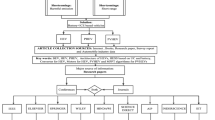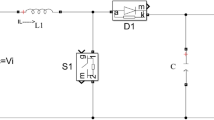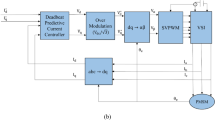Abstract
Electric Vehicles (EVs) are anticipated to dominate passenger car transportation, playing a pivotal role in advancing sustainable mobility. However, with the increasing enthusiasm for EVs, impediments endure within the realm of power transmission. This is especially evident in addressing challenges related to minimizing torque ripple and implementing advanced control techniques in traction for high-performance and efficient operation of EVs. Numerous control algorithms for motor drives have been developed in the recent past but face challenges in attaining effective control under varying drive cycles of EVs. To tackle these challenges, motor drive control algorithms integrate various control techniques, including field orientation control, model predictive control, intelligent control, etc. This paper proposes an innovative online-tuned MPCC algorithm based on the adaptive neuro-fuzzy inference system (ANFIS). The traditional proportional–integral (PI) controller is replaced with an adapted ANFIS algorithm, and the tuning of ANFIS parameters is achieved by leveraging the error between the reference and adjustable models through a hybrid training algorithm. The proposed novel control technique improves the dynamic speed response of permanent magnet synchronous motor drives EVs. This improvement is realized by replacing the PI-HCC controller with an ANFIS controller coupled with MPCC. A laboratory prototype of the proposed control technique for EVs has been developed, and a comparative analysis of ANFIS-MPCC techniques with other known control techniques has been presented. This paper also demonstrates the importance of choosing optimal motor control techniques for torque ripple minimization and improving the overall performance of EVs.

















Similar content being viewed by others
Data availibility
No datasets were generated or analysed during the current study.
References
Wang Z, Ching TW, Huang S, Wang H, Xu T (2020) Challenges faced by electric vehicle motors and their solutions. IEEE Access 9:5228–5249
Lara J, Xu J, Chandra A (2016) Effects of rotor position error in the performance of field-oriented-controlled PMSM drives for electric vehicle traction applications. IEEE Trans Ind Electron 63(8):4738–4751
Yang J, Chen W-H, Li S, Guo L, Yan Y (2016) Disturbance/uncertainty estimation and attenuation techniques in PMSM drives: a survey. IEEE Trans Ind Electron 64(4):3273–3285
Hong J, Park S, Hyun D, Kang T-J, Lee SB, Kral C, Haumer A (2012) Detection and classification of rotor demagnetization and eccentricity faults for PM synchronous motors. IEEE Trans Ind Appl 48(3):923–932
Suryakant SM, Singh M, Seth AK (2023) Minimization of torque ripples in PMSM drive using PI-resonant controller-based model predictive control. Electr Eng 105(1):207–219
Dat NT, Van Kien C, Anh HPH (2023) Advanced adaptive neural sliding mode control applied in PMSM driving system. Electr Eng 105(5):3255–3262
Sreejeth M, Singh M, Kumar P (2015) Particle swarm optimisation in efficiency improvement of vector controlled surface mounted permanent magnet synchronous motor drive. IET Power Electron 8(5):760–769
Schwenzer M, Ay M, Bergs T, Abel D (2021) Review on model predictive control: an engineering perspective. Int J Adv Manuf Technol 117(5–6):1327–1349
Shukla S, Sreejeth M, Singh M (2021) Minimization of ripples in stator current and torque of PMSM drive using advanced predictive current controller based on deadbeat control theory. J Power Electron 21:142–152
Cortés P, Kazmierkowski MP, Kennel RM, Quevedo DE, Rodríguez J (2008) Predictive control in power electronics and drives. IEEE Trans Ind Electron 55(12):4312–4324
Zhang Y, Ji C, You Q, Sun D, Xie Y (2023) Deadbeat predictive current control for surface-mounted permanent-magnet synchronous motor based on weakened integral sliding mode compensation. Appl Sci 13(21):11678
Wang J, Tang Y, Lin P, Liu X, Pou J (2019) Deadbeat predictive current control for modular multilevel converters with enhanced steady-state performance and stability. IEEE Trans Power Electron 35(7):6878–6894
Ramya L, Sivaprakasam A (2020) Application of model predictive control for reduced torque ripple in orthopaedic drilling using permanent magnet synchronous motor drive. Electr Eng 102(3):1469–1482
Karamanakos P, Liegmann E, Geyer T, Kennel R (2020) Model predictive control of power electronic systems: methods, results, and challenges. IEEE Open J Ind Appl 1:95–114
Li T, Sun X, Yao M, Guo D, Sun Y (2023) Improved finite control set model predictive current control for permanent magnet synchronous motor with sliding mode observer. IEEE Trans Transp Electrif. https://doi.org/10.1109/TTE.2023.3293510
Yu B, Song W, Yang K, Guo Y, Saeed MS (2021) A computationally efficient finite control set model predictive control for multiphase PMSM drives. IEEE Trans Ind Electron 69(12):12066–12076
Nguyen HT, Jung J-W (2018) Finite control set model predictive control to guarantee stability and robustness for surface-mounted PM synchronous motors. IEEE Trans Ind Electron 65(11):8510–8519
Liu X, Qiu L, Fang Y, Wang K, Li Y, Rodriguez J (2022) A fuzzy approximation for FCS-MPC in power converters. IEEE Trans Power Electron 37(8):9153–9163
Li T, Sun X, Lei G, Guo Y, Yang Z, Zhu J (2022) Finite-control-set model predictive control of permanent magnet synchronous motor drive systems: an overview. IEEE/CAA J Autom Sin 9(12):2087–2105
Sun X, Li T, Yao M, Lei G, Guo Y, Zhu J (2021) Improved finite-control-set model predictive control with virtual vectors for PMSHM drives. IEEE Trans Energy Convers 37(3):1885–1894
Larminie J, Lowry J (2012) Electric vehicle technology explained. John Wiley & Sons, Hoboken
Wu X, Zhang Y, Shen F, Yang M, Wu T, Huang S, Cui H (2023) Equivalent three-vector-based model predictive control with duty cycle reconstruction for PMSM. IEEE Trans Ind Electron 99:1–10
Shukla S, Sreejeth M, Singh M et al (2022) Improved ANFIS based MRAC observer for sensorless control of PMSM. J Intell Fuzzy Syst 42(2):1061–1073
Yang Y, Wen H, Li D (2017) A fast and fixed switching frequency model predictive control with delay compensation for three-phase inverters. IEEE Access 5:17904–17913
Han Y, Gong C, Yan L, Wen H, Wang Y, Shen K (2020) Multiobjective finite control set model predictive control using novel delay compensation technique for PMSM. IEEE Trans Power Electron 35(10):11193–11204
Ruuskanen V, Nerg J, Rilla M, Pyrhönen J (2016) Iron loss analysis of the permanent-magnet synchronous machine based on finite-element analysis over the electrical vehicle drive cycle. IEEE Trans Ind Electron 63(7):4129–4136
Author information
Authors and Affiliations
Contributions
The authors did not receive support from and organization for the submitted work.
Corresponding author
Ethics declarations
Conflict of interest
The authors declare no conflict of interest.
Additional information
Publisher's Note
Springer Nature remains neutral with regard to jurisdictional claims in published maps and institutional affiliations.
Rights and permissions
Springer Nature or its licensor (e.g. a society or other partner) holds exclusive rights to this article under a publishing agreement with the author(s) or other rightsholder(s); author self-archiving of the accepted manuscript version of this article is solely governed by the terms of such publishing agreement and applicable law.
About this article
Cite this article
Sangar, B., Singh, M. & Sreejeth, M. An improved ANFIS model predictive current control approach for minimizing torque and current ripples in PMSM-driven electric vehicle. Electr Eng (2024). https://doi.org/10.1007/s00202-024-02346-3
Received:
Accepted:
Published:
DOI: https://doi.org/10.1007/s00202-024-02346-3




